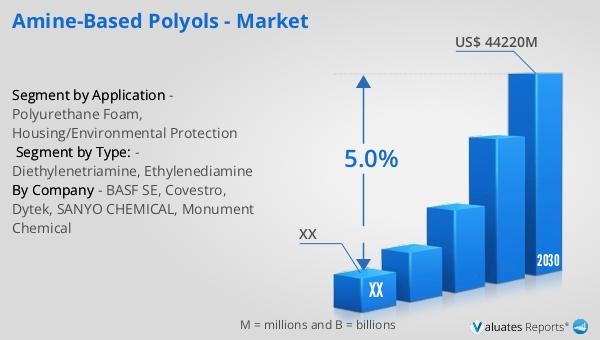List of Tables
Table 1. Amine-based Polyols Market Trends
Table 2. Amine-based Polyols Market Drivers & Opportunity
Table 3. Amine-based Polyols Market Challenges
Table 4. Amine-based Polyols Market Restraints
Table 5. Global Amine-based Polyols Revenue by Company (2019-2024) & (US$ Million)
Table 6. Global Amine-based Polyols Revenue Market Share by Company (2019-2024)
Table 7. Global Amine-based Polyols Sales Volume by Company (2019-2024) & (Tons)
Table 8. Global Amine-based Polyols Sales Volume Market Share by Company (2019-2024)
Table 9. Global Market Amine-based Polyols Price by Company (2019-2024) & (US$/Ton)
Table 10. Key Manufacturers Amine-based Polyols Manufacturing Base Distribution and Headquarters
Table 11. Key Manufacturers Amine-based Polyols Product Type
Table 12. Key Manufacturers Time to Begin Mass Production of Amine-based Polyols
Table 13. Global Amine-based Polyols Manufacturers Market Concentration Ratio (CR5 and HHI)
Table 14. Global Top Manufacturers Market Share by Company Type (Tier 1, Tier 2, and Tier 3) & (based on the Revenue in Amine-based Polyols as of 2023)
Table 15. Mergers & Acquisitions, Expansion Plans
Table 16. Global Amine-based Polyols Sales Value by Type: 2019 VS 2023 VS 2030 (US$ Million)
Table 17. Global Amine-based Polyols Sales Value by Type (2019-2024) & (US$ Million)
Table 18. Global Amine-based Polyols Sales Value by Type (2025-2030) & (US$ Million)
Table 19. Global Amine-based Polyols Sales Market Share in Value by Type (2019-2024) & (%)
Table 20. Global Amine-based Polyols Sales Market Share in Value by Type (2025-2030) & (%)
Table 21. Global Amine-based Polyols Sales Volume by Type: 2019 VS 2023 VS 2030 (Tons)
Table 22. Global Amine-based Polyols Sales Volume by Type (2019-2024) & (Tons)
Table 23. Global Amine-based Polyols Sales Volume by Type (2025-2030) & (Tons)
Table 24. Global Amine-based Polyols Sales Market Share in Volume by Type (2019-2024) & (%)
Table 25. Global Amine-based Polyols Sales Market Share in Volume by Type (2025-2030) & (%)
Table 26. Global Amine-based Polyols Price by Type (2019-2024) & (US$/Ton)
Table 27. Global Amine-based Polyols Price by Type (2025-2030) & (US$/Ton)
Table 28. Global Amine-based Polyols Sales Value by Application: 2019 VS 2023 VS 2030 (US$ Million)
Table 29. Global Amine-based Polyols Sales Value by Application (2019-2024) & (US$ Million)
Table 30. Global Amine-based Polyols Sales Value by Application (2025-2030) & (US$ Million)
Table 31. Global Amine-based Polyols Sales Market Share in Value by Application (2019-2024) & (%)
Table 32. Global Amine-based Polyols Sales Market Share in Value by Application (2025-2030) & (%)
Table 33. Global Amine-based Polyols Sales Volume by Application: 2019 VS 2023 VS 2030 (Tons)
Table 34. Global Amine-based Polyols Sales Volume by Application (2019-2024) & (Tons)
Table 35. Global Amine-based Polyols Sales Volume by Application (2025-2030) & (Tons)
Table 36. Global Amine-based Polyols Sales Market Share in Volume by Application (2019-2024) & (%)
Table 37. Global Amine-based Polyols Sales Market Share in Volume by Application (2025-2030) & (%)
Table 38. Global Amine-based Polyols Price by Application (2019-2024) & (US$/Ton)
Table 39. Global Amine-based Polyols Price by Application (2025-2030) & (US$/Ton)
Table 40. Global Amine-based Polyols Sales Value by Region: 2019 VS 2023 VS 2030 (US$ Million)
Table 41. Global Amine-based Polyols Sales Value by Region (2019-2024) & (US$ Million)
Table 42. Global Amine-based Polyols Sales Value by Region (2025-2030) & (US$ Million)
Table 43. Global Amine-based Polyols Sales Value by Region (2019-2024) & (%)
Table 44. Global Amine-based Polyols Sales Value by Region (2025-2030) & (%)
Table 45. Global Amine-based Polyols Sales Volume by Region (Tons): 2019 VS 2023 VS 2030
Table 46. Global Amine-based Polyols Sales Volume by Region (2019-2024) & (Tons)
Table 47. Global Amine-based Polyols Sales Volume by Region (2025-2030) & (Tons)
Table 48. Global Amine-based Polyols Sales Volume by Region (2019-2024) & (%)
Table 49. Global Amine-based Polyols Sales Volume by Region (2025-2030) & (%)
Table 50. Global Amine-based Polyols Average Price by Region (2019-2024) & (US$/Ton)
Table 51. Global Amine-based Polyols Average Price by Region (2025-2030) & (US$/Ton)
Table 52. Key Countries/Regions Amine-based Polyols Sales Value Growth Trends, (US$ Million): 2019 VS 2023 VS 2030
Table 53. Key Countries/Regions Amine-based Polyols Sales Value, (2019-2024) & (US$ Million)
Table 54. Key Countries/Regions Amine-based Polyols Sales Value, (2025-2030) & (US$ Million)
Table 55. Key Countries/Regions Amine-based Polyols Sales Volume, (2019-2024) & (Tons)
Table 56. Key Countries/Regions Amine-based Polyols Sales Volume, (2025-2030) & (Tons)
Table 57. BASF SE Company Information
Table 58. BASF SE Introduction and Business Overview
Table 59. BASF SE Amine-based Polyols Sales (Tons), Revenue (US$ Million), Price (US$/Ton) and Gross Margin (2019-2024)
Table 60. BASF SE Amine-based Polyols Product Offerings
Table 61. BASF SE Recent Development
Table 62. Covestro Company Information
Table 63. Covestro Introduction and Business Overview
Table 64. Covestro Amine-based Polyols Sales (Tons), Revenue (US$ Million), Price (US$/Ton) and Gross Margin (2019-2024)
Table 65. Covestro Amine-based Polyols Product Offerings
Table 66. Covestro Recent Development
Table 67. Dytek Company Information
Table 68. Dytek Introduction and Business Overview
Table 69. Dytek Amine-based Polyols Sales (Tons), Revenue (US$ Million), Price (US$/Ton) and Gross Margin (2019-2024)
Table 70. Dytek Amine-based Polyols Product Offerings
Table 71. Dytek Recent Development
Table 72. SANYO CHEMICAL Company Information
Table 73. SANYO CHEMICAL Introduction and Business Overview
Table 74. SANYO CHEMICAL Amine-based Polyols Sales (Tons), Revenue (US$ Million), Price (US$/Ton) and Gross Margin (2019-2024)
Table 75. SANYO CHEMICAL Amine-based Polyols Product Offerings
Table 76. SANYO CHEMICAL Recent Development
Table 77. Monument Chemical Company Information
Table 78. Monument Chemical Introduction and Business Overview
Table 79. Monument Chemical Amine-based Polyols Sales (Tons), Revenue (US$ Million), Price (US$/Ton) and Gross Margin (2019-2024)
Table 80. Monument Chemical Amine-based Polyols Product Offerings
Table 81. Monument Chemical Recent Development
Table 82. Key Raw Materials Lists
Table 83. Raw Materials Key Suppliers Lists
Table 84. Amine-based Polyols Downstream Customers
Table 85. Amine-based Polyols Distributors List
Table 86. Research Programs/Design for This Report
Table 87. Key Data Information from Secondary Sources
Table 88. Key Data Information from Primary Sources
List of Figures
Figure 1. Amine-based Polyols Product Picture
Figure 2. Global Amine-based Polyols Sales Value, 2019 VS 2023 VS 2030 (US$ Million)
Figure 3. Global Amine-based Polyols Sales Value (2019-2030) & (US$ Million)
Figure 4. Global Amine-based Polyols Sales Volume (2019-2030) & (Tons)
Figure 5. Global Amine-based Polyols Sales Price (2019-2030) & (US$/Ton)
Figure 6. Amine-based Polyols Report Years Considered
Figure 7. Global Amine-based Polyols Players Revenue Ranking (2023) & (US$ Million)
Figure 8. Global Amine-based Polyols Players Sales Volume Ranking (2023) & (Tons)
Figure 9. The 5 and 10 Largest Manufacturers in the World: Market Share by Amine-based Polyols Revenue in 2023
Figure 10. Amine-based Polyols Market Share by Company Type (Tier 1, Tier 2, and Tier 3): 2019 VS 2023
Figure 11. Diethylenetriamine Picture
Figure 12. Ethylenediamine Picture
Figure 13. Global Amine-based Polyols Sales Value by Type (2019 VS 2023 VS 2030) & (US$ Million)
Figure 14. Global Amine-based Polyols Sales Value Market Share by Type, 2023 & 2030
Figure 15. Global Amine-based Polyols Sales Volume by Type (2019 VS 2023 VS 2030) & (Tons)
Figure 16. Global Amine-based Polyols Sales Volume Market Share by Type, 2023 & 2030
Figure 17. Global Amine-based Polyols Price by Type (2019-2030) & (US$/Ton)
Figure 18. Product Picture of Polyurethane Foam
Figure 19. Product Picture of Housing/Environmental Protection
Figure 20. Global Amine-based Polyols Sales Value by Application (2019 VS 2023 VS 2030) & (US$ Million)
Figure 21. Global Amine-based Polyols Sales Value Market Share by Application, 2023 & 2030
Figure 22. Global Amine-based Polyols Sales Volume by Application (2019 VS 2023 VS 2030) & (Tons)
Figure 23. Global Amine-based Polyols Sales Volume Market Share by Application, 2023 & 2030
Figure 24. Global Amine-based Polyols Price by Application (2019-2030) & (US$/Ton)
Figure 25. North America Amine-based Polyols Sales Value (2019-2030) & (US$ Million)
Figure 26. North America Amine-based Polyols Sales Value by Country (%), 2023 VS 2030
Figure 27. Europe Amine-based Polyols Sales Value (2019-2030) & (US$ Million)
Figure 28. Europe Amine-based Polyols Sales Value by Country (%), 2023 VS 2030
Figure 29. Asia Pacific Amine-based Polyols Sales Value (2019-2030) & (US$ Million)
Figure 30. Asia Pacific Amine-based Polyols Sales Value by Country (%), 2023 VS 2030
Figure 31. South America Amine-based Polyols Sales Value (2019-2030) & (US$ Million)
Figure 32. South America Amine-based Polyols Sales Value by Country (%), 2023 VS 2030
Figure 33. Middle East & Africa Amine-based Polyols Sales Value (2019-2030) & (US$ Million)
Figure 34. Middle East & Africa Amine-based Polyols Sales Value by Country (%), 2023 VS 2030
Figure 35. Key Countries/Regions Amine-based Polyols Sales Value (%), (2019-2030)
Figure 36. Key Countries/Regions Amine-based Polyols Sales Volume (%), (2019-2030)
Figure 37. United States Amine-based Polyols Sales Value, (2019-2030) & (US$ Million)
Figure 38. United States Amine-based Polyols Sales Value by Type (%), 2023 VS 2030
Figure 39. United States Amine-based Polyols Sales Value by Application (%), 2023 VS 2030
Figure 40. Europe Amine-based Polyols Sales Value, (2019-2030) & (US$ Million)
Figure 41. Europe Amine-based Polyols Sales Value by Type (%), 2023 VS 2030
Figure 42. Europe Amine-based Polyols Sales Value by Application (%), 2023 VS 2030
Figure 43. China Amine-based Polyols Sales Value, (2019-2030) & (US$ Million)
Figure 44. China Amine-based Polyols Sales Value by Type (%), 2023 VS 2030
Figure 45. China Amine-based Polyols Sales Value by Application (%), 2023 VS 2030
Figure 46. Japan Amine-based Polyols Sales Value, (2019-2030) & (US$ Million)
Figure 47. Japan Amine-based Polyols Sales Value by Type (%), 2023 VS 2030
Figure 48. Japan Amine-based Polyols Sales Value by Application (%), 2023 VS 2030
Figure 49. South Korea Amine-based Polyols Sales Value, (2019-2030) & (US$ Million)
Figure 50. South Korea Amine-based Polyols Sales Value by Type (%), 2023 VS 2030
Figure 51. South Korea Amine-based Polyols Sales Value by Application (%), 2023 VS 2030
Figure 52. Southeast Asia Amine-based Polyols Sales Value, (2019-2030) & (US$ Million)
Figure 53. Southeast Asia Amine-based Polyols Sales Value by Type (%), 2023 VS 2030
Figure 54. Southeast Asia Amine-based Polyols Sales Value by Application (%), 2023 VS 2030
Figure 55. India Amine-based Polyols Sales Value, (2019-2030) & (US$ Million)
Figure 56. India Amine-based Polyols Sales Value by Type (%), 2023 VS 2030
Figure 57. India Amine-based Polyols Sales Value by Application (%), 2023 VS 2030
Figure 58. Amine-based Polyols Industrial Chain
Figure 59. Amine-based Polyols Manufacturing Cost Structure
Figure 60. Channels of Distribution (Direct Sales, and Distribution)
Figure 61. Bottom-up and Top-down Approaches for This Report
Figure 62. Data Triangulation
Figure 63. Key Executives Interviewed


